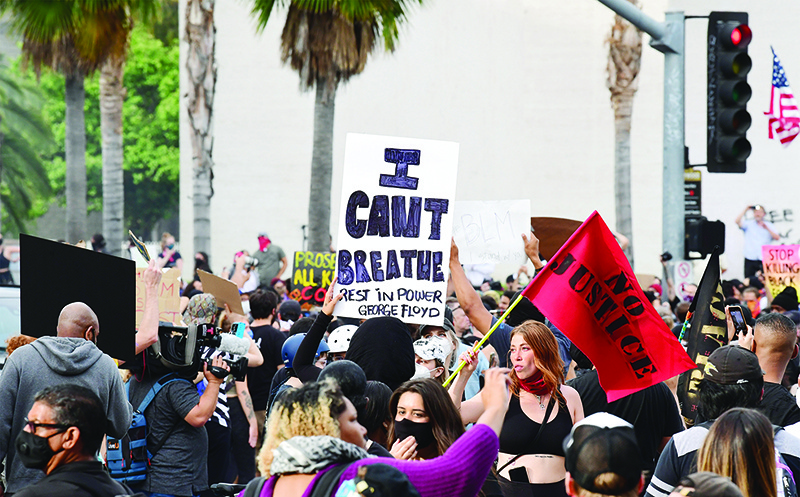
GENEVA: The coronavirus pandemic’s disproportionate impact on ethnic minorities, and protests triggered by George Floyd’s death, have laid bare “endemic inequalities” in the United States, the UN rights chief said Tuesday, urging action. Michelle Bachelet, the UN High Commissioner for Human Rights, warned that the COVID-19 crisis has had a worse impact on racial and ethnic minorities in the United States and a range of other countries.
“This virus is exposing endemic inequalities that have too long been ignored,” she said in a statement. Similar inequalities were also fuelling the widespread protests over the police killing in Minneapolis last week of Floyd, an unarmed black man. “In the United States, protests triggered by the killing of George Floyd are highlighting not only police violence against people of color, but also inequalities in health, education, employment and endemic racial discrimination,” Bachelet said.
Floyd was killed when a white police officer knelt on his neck, and video images of his killing have sparked demonstrations in hundreds of US cities against police brutality and racism. It has been the most widespread unrest in the United States since 1968, when cities went up in flames over the slaying of civil rights leader Martin Luther King Jr. Bachelet meanwhile stressed that entrenched racial discrimination is taking a heavy health toll during the pandemic, which has killed more than 375,000 people out of nearly 6.3 million infected worldwide.
In the United States, which is the worst-hit country with over 105,000 deaths, she noted that the virus death rate for African Americans is reported to be more than double that of other racial groups. Her statement also highlighted the situation in Britain, where government data for England and Wales shows a death rate for blacks, ethnic Pakistanis and Bangladeshis that is nearly double that of whites.¬ÝAnd she pointed to Brazil, where people of colour in Sao Paulo are 62 percent more likely to die from the virus than whites, and in France‚Äôs heavily minority-inhabited Seine Saint-Denis suburb of Paris, which has reported higher excess mortality figures than other areas.
‘Urgent steps needed’
“The appalling impact of COVID-19 on racial and ethnic minorities is much discussed, but what is less clear is how much is being done to address it,” Bachelet said. “Urgent steps need to be taken by states, such as prioritising health monitoring and testing, increasing access to healthcare, and providing targeted information for these communities.”
She said the disparities likely resulted from a range of factors linked to marginalization, discrimination and access to healthcare, along with economic inequalities, overcrowded housing and environmental risks. People from racial and ethnic minorities are also more likely to have jobs that require them to leave their home, like the transport, health and cleaning sectors, raising the risk of infection.¬Ý‚ÄúIt is a tragedy that it took COVID-19 to expose what should have been obvious - that unequal access to healthcare, overcrowded housing and pervasive discrimination make our societies less stable, secure and prosperous,‚Äù Bachelet said.
‘Health of the nation’
Thousands of people protesting at close quarters, shouting demands and coughing violently when hit by tear gas: experts fear demonstrations roiling the US could reignite the spread of the coronavirus. But, stress clinicians and researchers, racialized police violence itself remains a grave and neglected public health crisis for African Americans, threatening not just their lives but raising the risk of stress-related diseases from heart failure to cancer.
It has been just over a week since George Floyd, an African American man, died after a white police officer knelt on his neck for several minutes, sparking a wave of protests across the country against institutional racism. For Ebony Hilton, a physician at the University of Virginia hospital who is herself black, the issue highlights what she calls the threat of the two pandemics: COVID-19, and police brutality. “We are expecting to see a spike (in coronavirus cases) because there’s no social distancing and unfortunately most people wear their masks incorrectly,” she told AFP.
Law enforcement agencies have routinely fired tear-inducing pepper spray and tear gas, a nerve agent that causes intense burning, in order to disperse crowds. On Monday, for example, federal police hit peaceful activists in Lafayette Park outside the White House with rubber bullets and tear gas in order to let President Donald Trump get a photo-op at a historic church that had suffered damage the night before. ‚ÄúThe pepper spraying and resulting coughing/gagging also heightens risk,‚Äù said Hilton. ‚ÄúAdditionally, COVID can be spread via droplets on eyes and many aren‚Äôt wearing goggles.‚Äù¬Ý ‚Äî Agencies









